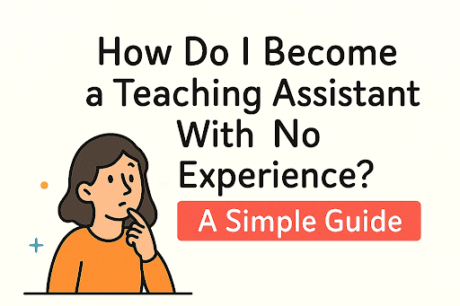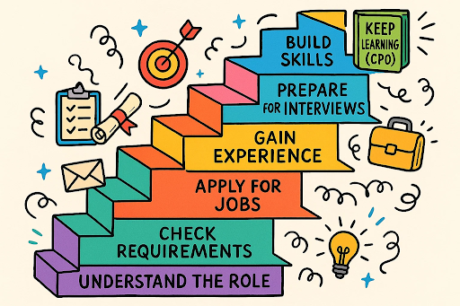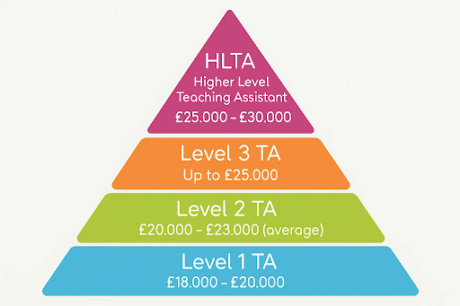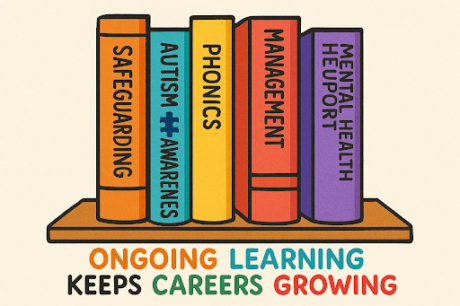If you’ve ever asked yourself, “How do I become a teaching assistant?” you’re in the right place. Becoming a teaching assistant means working closely with teachers to help students learn and grow. It’s a rewarding job where you support children, help with classroom activities, and sometimes even plan lessons.

You don’t need a degree to get started, but having some qualifications or experience can really help. You’ll also need good communication skills, patience, and a love for working with kids. Most importantly, teaching assistants make a real difference in schools every day, and that’s what makes the role so special.
In this guide, we’ll walk you through the steps to become a teaching assistant and what to expect on the way.
What is a Teaching Assistant?
Ever wondered, what is a teaching assistant? A teaching assistant (or TA) is someone who supports teachers in the classroom. They work with pupils to help them learn, stay focused, and feel supported. If you’re asking, how do I become a teaching assistant, it’s good to know what the job involves day to day.
What Do Teaching Assistants Do?
TAs do a lot more than people realise. They’re a key part of the classroom, helping both students and teachers. Here’s what a typical day might include:
- Helping small groups with reading or writing
- Supporting children who have special needs
- Preparing resources for lessons
- Keeping pupils focused during class
- Watching behaviour and giving feedback to the teacher
- Helping with school trips, clubs, and events
How TAs Help Reduce Teacher Workload
Teaching assistants play a huge role in cutting down the teacher’s workload. That’s why the government sees them as a real asset.
TAs can lead small groups, manage behaviour, and prep lessons. This gives teachers time to plan and focus on the bigger picture. It’s a smart way to keep learning on track without overloading teaching staff. Schools with strong TA support often see better results and happier classrooms.
How Do I Become a Teaching Assistant: Step-by-Step Guide
Thinking about working in a school? Here’s how to become a teaching assistant, step by step.

1. Understand the Role and Daily Expectations
Start by learning what a teaching assistant does. They help pupils, support teachers, and keep the classroom running well. Some work with whole classes. Others support pupils with SEN. You’ll need to follow safeguarding rules, stay calm under pressure, and build strong relationships with children.
2. Check the Requirements to Be a Teaching Assistant
Most schools ask for GCSEs in English and maths. Some may want childcare experience or a college course. This is where many ask: “What qualifications do I need to be a teaching assistant?”
Let’s break that down next.
3. Get the Right Qualifications
Start with a Level 2 Certificate in Supporting Teaching and Learning. This helps you learn the basics. Many schools now ask for a Level 3 teaching assistant qualification, especially for SEN or classroom responsibility.
If you want to lead small groups or cover lessons, consider becoming a HLTA (Higher Level Teaching Assistant). The HLTA salary UK is higher than standard TA pay.
4. Gain Experience in Schools
You don’t need a job to get started. Volunteer at your local primary or secondary school. You could also try after-school clubs or tutoring. Even childcare, youth work, or coaching counts. These show schools you can work with children and handle different situations.
5. Apply for Teaching Assistant Jobs
Look on your local council job portal, school websites, or multi-academy trusts (MATs). You can also register with teaching agencies. Try this search: “how to be a teaching assistant near me” – many listings will pop up.
6. Prepare for Interviews
Most TA interviews include common questions like:
- “Why do you want to work with children?”
- “How would you manage behaviour?”
- “What is safeguarding?”
You may also get a safeguarding scenario or a short classroom task.
7. Build Key Teaching Assistant Skills
Schools want confident communicators. You’ll also need classroom management, teamwork, and basic IT skills. SEN knowledge helps too. Ask yourself: “What do teaching assistants do well?” The best ones stay calm, caring, and clear.
8. Keep Learning With CPD
Schools love TAs who want to grow. Look for CPD (continuing professional development) in phonics, SEN, mental health, or behaviour support. Extra training can also boost your pay – especially for SEN teaching assistant roles.
Qualifications You’ll Need to Be a Teaching Assistant in 2025
Wondering what qualifications you need to be a teaching assistant in 2025? Here’s a simple breakdown.
1. Start With GCSEs
Most schools want GCSEs in English and maths. Some accept Level 2 equivalents. But a pass in both is best.
2. Get a Level 2 Certificate
The Level 2 Certificate in Supporting Teaching and Learning is the usual starting point. You’ll learn about safeguarding, communication, and classroom basics.
3. Progress to Level 3
The Level 3 Diploma suits TAs who want more responsibility. It opens doors and boosts pay. Many TAs at this level earn up to £25,000. The exact Level 3 teaching assistant salary depends on your school and hours.
4. Aim for HLTA Status
Want to lead small groups or cover lessons? Train as a Higher Level Teaching Assistant (HLTA). This role brings more pay and duties. The HLTA salary UK can reach £30,000.
5. Add SEN Training
Schools often need SEN support. Short SEN courses boost your job chances.They also lead to better SEN teaching assistant pay and long-term options.
6. Complete a DBS Check
You must pass a DBS check before working in schools. It shows you’re safe to work with children. Most schools help with this process.
7. Consider Apprenticeships or Adult Funding
You don’t always need to pay for courses. A teaching assistant apprenticeship lets you earn while you train. Career changers and adults may get government funding or free training from local councils.
The Different Levels of Teaching Assistant Roles
There’s more than one type of TA. The level you work at depends on your training, experience, and confidence. Here’s a quick breakdown:
Level 1 Teaching Assistant
You work under close supervision. You support learning but don’t usually lead any sessions.
Level 2 Teaching Assistant
You work more independently and may lead small groups. You understand how lessons are planned and delivered.
Level 3 Teaching Assistant
You have strong knowledge of how children learn. You support with planning and assessment and may supervise other TAs.
Higher Level Teaching Assistant (HLTA)
You take on more responsibility. HLTAs can teach classes on their own, assess pupil progress, and cover for teachers. Many wonder about HLTA salary UK — it’s higher than other TA roles due to the added responsibility.

What About SEN Teaching Assistants?
SEN (Special Educational Needs) teaching assistants work with pupils who need extra help. These children might have autism, ADHD, dyslexia, or physical needs.
SEN TAs give one-to-one support, help manage behaviour, and keep students involved in lessons. Demand for SEN TAs is growing fast. Schools are always on the lookout for caring, patient people to fill these roles.
SEN teaching assistant pay is often higher than general classroom TA roles, especially if you have experience or extra training.
Quick Look: TA Responsibilities
- Support learning in class
- Work one-to-one or in small groups
- Help pupils with special needs
- Set up and tidy classroom resources
- Watch behaviour and offer feedback
- Cover classes (HLTA only)
What Does a Teaching Assistant Do?
A teaching assistant (TA) helps pupils learn and supports teachers in and out of the classroom. But that’s just the start.
Classroom Support Comes First
TAs help with classwork, reading, group tasks, and one-to-one learning. They keep pupils focused and ready to learn. They also prepare resources, tidy classrooms, and support lessons across all subjects.
But Their Role Goes Beyond the Classroom
TAs do more than just help in lessons. They:
- Keep pupils safe by following safeguarding rules
- Offer pastoral support to help with behaviour and emotional needs
- Watch for problems and report issues to the teacher or SENCO
- Help with ICT during lessons and fix small tech problems
They also often:
- Run or support after-school clubs, such as homework, sports, or crafts
- Help with exam support by reading, scribing, or keeping pupils calm
- Carry out intervention sessions for pupils who need extra help
SEN Teaching Assistants Do Even More
Some TAs work with pupils who have special educational needs (SEN). These pupils might need extra care, help with learning, or support with behaviour. SEN TAs work closely with the SENCO and follow education plans (EHCPs). They often stay with one pupil or a small group all day.
Teaching Assistant Salary in 2025
Pay depends on the school and location. Most TAs earn between £18,000 and £24,000 per year. Many jobs are term-time only, so pay is spread across 12 months. In London, London weighting adds extra pay. A Level 3 teaching assistant salary can reach up to £25,000.
If you train as a Higher Level Teaching Assistant (HLTA), you can earn more – usually £25,000 to £30,000. SEN teaching assistant pay is often slightly higher due to extra duties.
For Career Changers: Parents or Professionals Starting Fresh
A lot of parents, carers, and even people from office jobs decide to switch careers and become Teaching Assistants. If you’ve raised kids or led a team, you already have so many of the skills that matter in the classroom. Patience, being organised, and genuinely caring for others—these are the things that make a real difference.
And honestly? Working in a school can feel incredibly rewarding. It’s not just a job; it’s a chance to help shape young lives and be part of something bigger. Plus, you might be able to get funded training or join a return-to-work scheme to make the move even easier.
If you’ve ever thought, “I’d love to do something more meaningful,” this could be the fresh start you’re looking for.
CPD Courses That Boost Your Career as a Teaching Assistant
If you want to move forward in your job, CPD (continuing professional development) makes a big difference. Let’s look at why it matters and what to choose in 2025.
Why CPD Matters More Than Ever
Schools want staff who keep learning. CPD shows you’re committed and ready to take on more. If you’re asking “how to become a teaching assistant who stands out”, CPD is the answer. It also supports your move from Level 3 to HLTA status. And that means a better job, more hours, and a higher HLTA salary UK.
Top CPD Topics in 2025
Some areas of training are in high demand. The right course can help you earn more or switch roles.
Here are the most popular topics right now:
- Safeguarding (always essential in schools)
- Autism awareness and SEN support strategies
- Phonics (especially for early years and KS1 support)
- Behaviour management for calm, confident classrooms
- Mental health (understanding pupil needs and stress)

Many schools now ask if you’ve done these before shortlisting you.
Final Word
So, how do you become a teaching assistant? You learn, train, gain experience, and show up ready to support children. It’s a rewarding job with real impact. And if you keep learning, you can grow into SEN roles or even HLTA positions.
Teaching assistant roles offer great experience, especially with digital and SEN skills in demand. To improve your career, consider joining our Teaching Assistant course for the best training and support.




